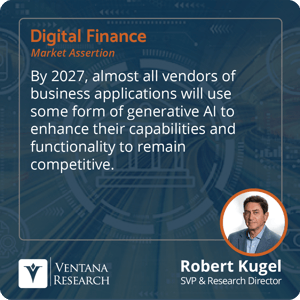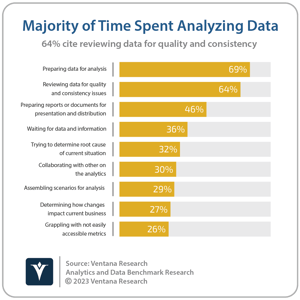Because artificial intelligence is top-of-mind, Workday spent a great deal of time on the topic at its recent Workday Rising annual user group meeting in San Francisco. It was front and center in the general sessions, in the announcements made at the event and in the product roadmaps.
The sudden attention paid to AI and generative AI in the media has provoked alarmists to warn of potential catastrophic and even dystopian outcomes from the use of the technology. Because of AI’s centrality to the future of business computing as well as Workday’s roadmap, it was necessary for management to level-set the discussion about AI and remind customers that it has been working on AI and related issues for some time. Messaging highlighted how AI is already at work and what’s within easy reach and emphasized the company’s focus on accuracy and risk management in all matters concerning AI.
Workday has in place a customer-centric approach to AI and generative AI that it calls responsible artificial intelligence. RAI governance features:
- An emphasis on transparency (explainability and interpretability) with disclosure to support human review that builds trust.
- A framework and methodology that evaluates risks in the application of AI for specific users and use cases. These enable Workday’s managers to assess risk sensitivity that can lead to design modifications for risk mediation or elimination.
- A fundamental approach to data governance (security in its collection, management and application) that promotes corporate integrity and personal privacy.
To ensure that these aren’t empty measures, Workday employs a dedicated resource for a cross-disciplinary review of its AI and machine language technologies and the related internal training of its product groups to support RAI. The company has explicit guidelines and review processes to ensure compliance with its AI ethical principles.
Workday’s RAI approach provides customers with detailed documentation and descriptions of how its software and technology work. This is intended to eliminate the “black box” issue that can arise with AI so customers can understand why they get the results they do. It also aims to eliminate unconscious or unintended biases as much as possible – a point of great sensitivity in human resources but also applicable to all business decisions. Indeed, properly configured, machines may be capable of making decisions or providing advice that is more objective than an individual’s decision-making. This is an already well-worn academic topic but is likely to rage as organizations adopt AI in managing operations.
Workday also recognizes that even the most responsibly designed AI-enabled software might not be used as intended. So, customers need to be able to configure the AI technology to suit business needs based on specific cultural, legal or regulatory norms. This includes the ability to switch some features on or off depending on circumstances and tools to evaluate fairness and conformance of AI systems to basic organizational strategies and constraints.
There are perils aplenty ahead with AI and generative AI, and there are bound to be well-publicized failures. Yet, an informed analysis would conclude that these efforts will have an overwhelmingly positive impact, resulting in the rapid adoption of software that uses AI to enhance productivity. Ventana Research asserts that by 2027, almost all vendors of business applications will use some form of generative AI to enhance capabilities and functionality to remain competitive.
in the rapid adoption of software that uses AI to enhance productivity. Ventana Research asserts that by 2027, almost all vendors of business applications will use some form of generative AI to enhance capabilities and functionality to remain competitive.
Workday’s “unified data” architecture was another point of focus in its keynotes at the event. I use the term “data pantry” (somewhat tongue in cheek) to describe this type of data store that’s part of a business application platform created for a specific set of users and use cases. It’s a data pantry because, unlike a general-purpose data store such as a data warehouse or data lake, everything the user needs is readily available and easily accessible, with labels that are immediately recognized and understood. The key benefits of unified data include:
Because the potential is vast, there’s almost no limit to the use cases that one can dream up for AI and generative AI. However, there are two sets of constraints to adoption by organizations. One that I covered in a recent research note is the cost of AI – specifically generative AI. That is, how the costs incurred – through investment and operation – will be distributed along the value chain and how this will affect the demand for AI ‒ by whom and for what purpose. It’s a question that needs asking even though, at this stage in the market’s evolution, I believe it is a classic underdetermined linear algebra problem, the kind with fewer equations than unknowns and, therefore, an infinite number of solutions.
recent research note is the cost of AI – specifically generative AI. That is, how the costs incurred – through investment and operation – will be distributed along the value chain and how this will affect the demand for AI ‒ by whom and for what purpose. It’s a question that needs asking even though, at this stage in the market’s evolution, I believe it is a classic underdetermined linear algebra problem, the kind with fewer equations than unknowns and, therefore, an infinite number of solutions.
The second limit to making use cases a reality is data availability. As noted, Workday has a data container and methods for managing its data supply chain. However, many organizations will struggle to have all the necessary data available for the more complex or advanced use cases. That said, I’m not sure this matters because, initially, organizations are more likely to adopt AI for uncomplicated processes where accuracy is easily verified. Within a short period, most organizations are likely to have a data environment that supports a wide range of straightforward use cases that can have a positive impact on productivity.
For example, while managing accounts receivable and accounts payable with AI may seem trivial, this and other enhancements to how daily work is performed speak to a core challenge facing finance organizations: The need to achieve major productivity gains to address the shortage of accountants. According to the U.S. Bureau of Labor Statistics, in 2020-22, 17% of accountants either retired or switched careers. The old finance department standby of throwing people at a problem is much less workable today. This shift in workers will continue for at least the next several years as a result of baby-boomer retirements and a drop in college students choosing accounting as their major. Technology addresses the issue by automating repetitive tasks, including those that make the department’s staff more productive. For some time, the (hyperbolic) scare story about AI was the number of jobs that would be lost to robots. Instead, it looks like AI will address the shortage of available finance and accounting talent.
Workday Rising demonstrated that the company continues to evolve its product capabilities and the underlying architecture to match ongoing technology advances that support the digital transformation of the office of finance. As organizations consider replacing core enterprise resource planning systems or implementing a dedicated planning application, I recommend considering Workday Financial Management and Workday Adaptive Planning for these roles.
Regards,
Robert Kugel


 in the rapid adoption of software that uses AI to enhance productivity. Ventana Research asserts that by 2027, almost all vendors of business applications will use some form of generative AI to enhance capabilities and functionality to remain competitive.
in the rapid adoption of software that uses AI to enhance productivity. Ventana Research asserts that by 2027, almost all vendors of business applications will use some form of generative AI to enhance capabilities and functionality to remain competitive. recent research note is
recent research note is 








